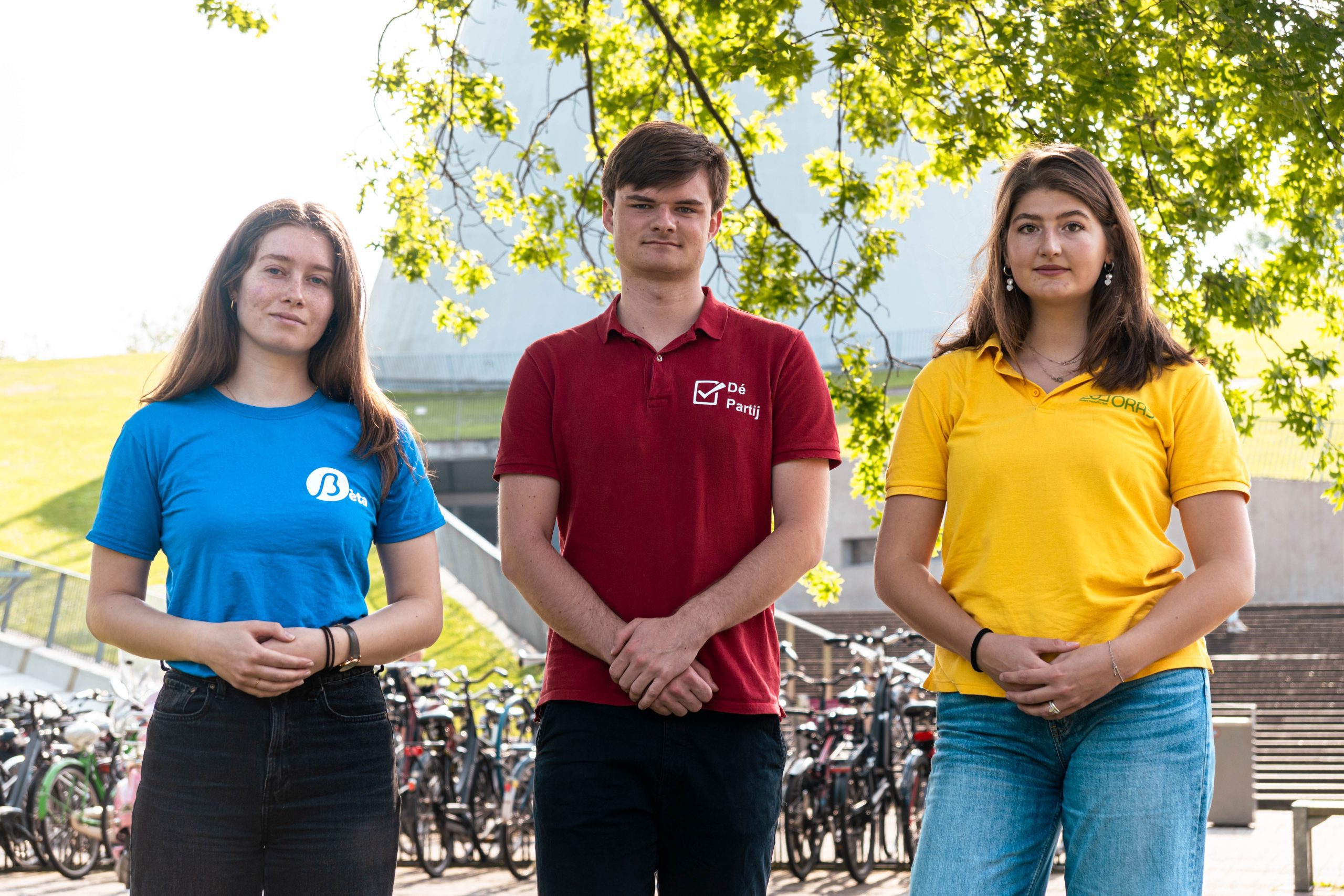This Wednesday and Thursday, students at TU Delft can vote for the Student Council for the coming academic year. There are three parties on the voting slip: Oras, Lijst Bèta and Dé Partij. What are their plans? The party candidates explain.
From left to right the leading candidates of Lijst Bèta, Dé Partij and Oras. (Photo: Thijs van Reeuwijk)
Cast your vote
Click here to vote for the Central and Faculty Student Council.
How do you differentiate yourself from the other parties?
Merel van Gruijthuijsen, Lijst Bèta : “We are the only party on the Student Council that prioritises a diverse and inclusive TU Delft. It is the reason that we have always had an international party member over the last few years. We are also the only party on the Council that has someone whose portfolio includes social safety. We see ourselves as progressive and we dare speak out, such as on the situation in Gaza and the importance of having an independent university newspaper.”
Koos Meesters, Dé Partij: “We take a position on the difficult political decisions that TU Delft will have to take in the near future, including ties with the fossil fuel industry and internationalisation. We think that students should be able to vote in these issues. This would not be possible without clear standpoints. We foster greater transparency – which is our foundation – through the elections.”
Step Kruisinga, Oras: “We also look at developments outside the lecture halls. These could be by being in a Dream Team, having an administrative position, or by doing an internship. Your student time is more than just studying, and TU Delft should encourage and support this.”
Why vote for the Student Council?
This year you can vote in the Student Council elections on Brightspace from 08:00 on Wednesday 15 May to 17:00 on Thursday 16 May. You vote for the members of the central Student Council and your local Faculty Student Council. The members are elected every year. The Student Council has a consultation meeting with the Executive Board every month and may give its advice on subjects such as education, the organisation, the management and the financial support for students.
The Student Council has the right of consent for a number of subjects. This means that the plans in question may only go ahead with the agreement of the Student Council. The Student Council also has the right of initiative so that members can propose ideas. Being on the Council is a full-time job. Apart from the Central Student Council, each faculty has its own Faculty Student Council that works on faculty issues.
This year, three parties are standing in the elections for the central Student Council: Lijst Bèta, Oras and Dé Partij. The first two have been involved for a long time, and Dé Partij joined for the first time last year. The Student Council acts in unison during the academic year, but each party has its own profile and priority areas. So by carefully considering which party, or even individual candidate, you wish to vote for, you can have a say in the composition of the Council and thus on TU Delft’s policy.
- More information? We answered seven questions about the Student Council and the elections in this article.
How do you think social safety can be improved at TU Delft?
Dé Partij: “Gut wrenching stories about how some TU Delft staff members treat students show that the problem goes beyond only staff members. It is a human problem, so you really need to find solutions with and in people. If someone is resistant to change, you can say that that person does not fit today’s TU Delft anymore. That said, you should give everyone the chance to change.”
Oras: “We will look closely at the situations in which there is a relationship of dependency. For example during someone’s bachelor’s, master’s thesis, or Doctoral Programme. We are pleased that the change management plan goes beyond staff members. It is important that TU Delft looks at the solutions that are already working in the student community.”
Lijst Bèta: “We have drawn up a list of eight points for the Executive Board. Among the things we suggest are transparency, sanctions, clear actions, dialogue, and representative diverse advisory groups. We also believe that all communications must be in two languages and accessible for all students. To this end we are now working on a page about the Student Council on Brightspace.”

How can you further enhance social safety within the student community?
Oras: “At the moment, TU Delft often opts for punishment when something goes wrong at student associations, but what they really need is help. We want their current initiatives to be supported. Use the momentum to make social safety open for discussion at every level and in every group. For example during the reception events for first years such as OWee and the introduction period.”
Lijst Bèta: “Through raising awareness such as consent and bystander training. And making well trained confidential advisors available. Social safety was already on our radar before the Inspectorate of Education’s report was published. We strongly believe that if the Inspectorate would carry out an investigation into social safety among students, if would come up with worrying findings.”
Dé Partij: “The most important thing is continuous attention. There are lots of initiatives and programmes in the student community to tackle this issue. In that sense, we may well be ahead of TU Delft as an organisation.”

Vice-Rector Magnificus Rob Mudde announced that he will step down this autumn. The Student Council has a consultation meeting with him every month and is involved in the selection procedure of his replacement. What are you looking for in his successor?
Lijst Bèta: “We are not in support of a classic administrator who only talks the talk. We want someone who genuinely values education and students, and is involved and sincere. Someone with whom you can have a good discussion, both informally and formally. Someone with whom you may not agree with, but can still work with.”
Dé Partij: “We are hoping for someone that understands student life and with whom you could – by way of example – have a pint with in the faculty bar. To us, it does not have to be someone at TU Delft, a dean or professor. In fact, preferably not at this point in time. We simply want a good administrator. This should be the only worthwhile criterion.”
Oras: “Apart from being strongly engaged in education, we would like a successor to have an affinity with student life and student associations. Rob really was sincerely engaged with student life. He was always there for informal contact and often attended student events. We would like to see this in the successor too.”

Of the actions listed in your party programme, which have you achieved over the last year?
Dé Partij: “Getting the meatball sandwich back on the menu, but more importantly, making the Student Council more transparent. In one example, the rules stated that the other parties should not be talked about negatively. We scrapped this immediately. We also now publish the dates and minutes of the public meetings. And we also showed that, without consultation with students, EUR 1.2 million that was earmarked for social activities for students was spent on a meditation hut (in Dutch) at X.”
Oras: “We made sure that the unique TU Delft student culture was widely recognised in TU Delft’s Strategic Agenda (2024-2030). We also got the subject of ‘shared housing’ on the political agenda. Apart from these, we also made sure that as of 2024, EUR 35,000 would be made available for student associations for activities related to well-being.”
Lijst Bèta: “The Sustainability Task Forces discuss sustainability at the faculties. Gelijkspel (equality game, a workshop on behavioural norms around sex, Eds.) training during every first-years’ weekend. Diversity & Inclusion teams at every faculty. Transparency about partnerships. And we ensured that Student Onbeperkt, the platform for TU Delft students with a functional impairment, is part of the brainstorming process about accessibility in new buildings.





Comments are closed.